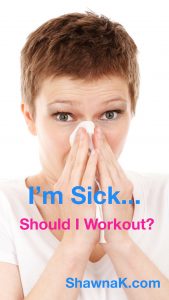Invariably everyone will succumb to the sniffles or the flu from time to time. If sickness strikes, what should you do?
Many people ask me if it’s okay to train? Will working out help or hinder recovery.
Here’s what I suggest…
There’s a big difference between working out and active movement.
To be clear, in my books, a workout is designed to cause ‘adaptive stress’ to your body so that it improves it’s fitness level and transforms your physique.
If you’re coming down with something, this sort of workout is detrimental to remaining healthy and sickness free. However, it doesn’t mean that you need to dive for the couch and sleep for a week.
If you feel a little sniffle or something coming on, as long as your symptoms are ‘above the neck’, I’m all for some ‘active movement’. This is NOT a full on workout that will make you a hot mess. This sort of workout may not change your physique or IMPROVE your fitness level, but it will maintain your fitness/physique and make you feel good – it will not deplete it and cause you to feel like you’ve been hit by a truck.
In fact, an active movement style workout has been shown to boost immunity. Low intensity non-panting “cardio” when suffering from colds, done with minimal heart rate elevation, preferably outside, seem to offer health and immune boosting benefits.
In a nut shell here’s a good rule of thumb:
Consistent, moderate exercise and resistance training can strengthen the immune system over time. So, train hard while you’re healthy.
Exercise can help guard against illness but there becomes a point of diminishing returns. Science shows that people who never exercise got sick pretty often. People who exercised between once a month and three times a week do the best. And people who exercise more than four times a week get sick most often.
times a week do the best. And people who exercise more than four times a week get sick most often.
Single high intensity or long duration exercise sessions can interfere with immune function. So take it easy when you’re feeling sick.
This is due to the stress exercise puts on the body. If exercise is causing physical stress and care isn’t taken for recovery, decreased immunity results.
Basically our body is more susceptible to illness when we’re stressed. Stress can result from many things including physical stress (exercise, infection, physical labor, etc), environment (pollution, heat/cold, etc), psychological (relationships, financial, career, etc). There is short term or acute stress and long term or chronic stress. Our body can adapt quite well to acute stress, it’s the chronic stress that is the problem.
Here are some other interesting factors related to immunity…
- Estrogens generally enhance immunity while androgens can suppress it. This may explain why women tend to do better with colds than men.
- Obviously, poor quality sleep and/or prolonged sleep deprivation jeopardizes immune function.
- Our innate immune response can break down as we get older. But here’s the good news: staying physically active and eating a nutritious diet can offset many of these changes.
- The more ‘experienced exerciser’ you are, the better your body tends to handle exercise. In other words, it’s not as much of a stressor. Basically, a higher level of fitness is protective as it may limit the stress response to exercise.
To sum it up, if you’re feeling a little under the weather, it’s best to take it easy for a day or two. If you’ve been under the weather for 3 days, take 3 days to ease back into exercise. If you want to exercise while not feeling 100%, do something with lower intensity and lower heart rate elevation to reduce stress put on your system.
If your symptoms include body aches and fever, it’s best to rest completely until the fever passes.
Maintain a healthy lifestyle and wash your hands regularly to avoid illness.
Join me on Facebook here: https://www.facebook.com/groups/Healthysecrets/
You’ll find a lovely community of supportive and motivated women and I’m there giving great health and fitness advice to help you lose your menopause belly and feel your very best!




